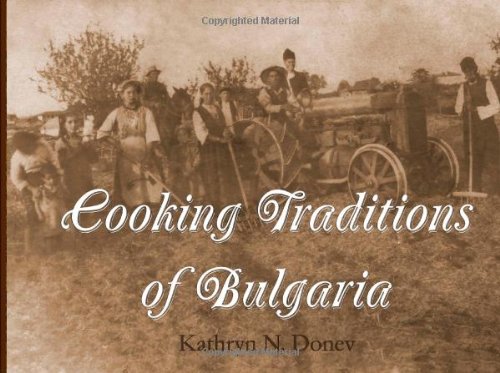90 Years Ago Pastor Nicholas Nikolov Established the Pentecostal Union of Bulgaria
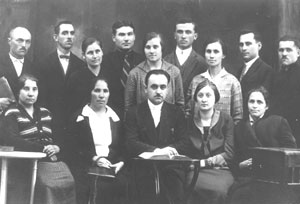 By the fall of 1927 the Pentecostal revival from Bourgas extended to several outreaches. Appropriate recognition was given by the General Council of the Assemblies of God in their September, 1927 meeting. The Latter Rain Evangel also reported revival in Bulgaria, workers trained at the Bible School and a good number saved and baptized with the Holy Spirit.
By the fall of 1927 the Pentecostal revival from Bourgas extended to several outreaches. Appropriate recognition was given by the General Council of the Assemblies of God in their September, 1927 meeting. The Latter Rain Evangel also reported revival in Bulgaria, workers trained at the Bible School and a good number saved and baptized with the Holy Spirit.
With this avid success and the arrival of Nikolov’s first-born son on November 9, 1927 came the second attempt to unite Bulgarian Pentecostals. A preliminary meeting was held in February of 1928 in Rouse where the Union’s establishing meeting was scheduled for March 28 in Bourgas.
To no surprise, only 14 delegates representing five congregations attended. The delegates voted and received the Union’s by-laws and statement of faith, based on the same documents by the Assemblies of God in America. The first annual conference of the new Union followed in October in Varna. A national General Council was set and the Executive Committee was chaired by Pastor Nikolov – at the time of his appointment he was only 28 years of age.
Trained in the United States and familiar with the Assemblies of God structure, Nikolov purposed to replicate the same organization in Bulgaria. Unfortunately, most Bulgarian Pentecostals in 1928 did not have a clear perception of the Assemblies of God and hardly felt part of the denomination. With only 20 members, the new organization was a small minority and did not represent the vast diversity within Bulgarian Pentecostalism at the time. Neither did it cause the split among Bulgarian Pentecostals as often held. The official registration of the Pentecostal Union simply confirmed the deepening division among Pentecostals in Bulgaria that had taken place since Zaplishny was deported in 1924.
Ancient Recipes of Bulgaria now for Kindle
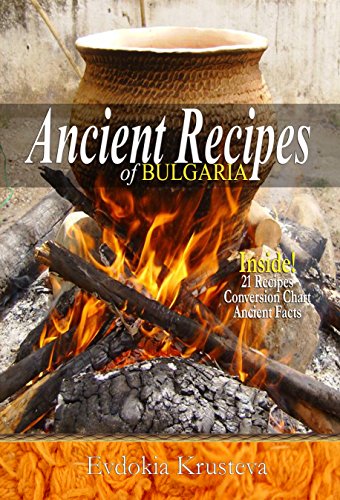 Ancient Recipes of Bulgaria, Second Edition
Ancient Recipes of Bulgaria, Second Edition
By Evdokia Krusteva
This cookbook features nearly two dozen truly ancient recipes of Bulgarian cooking. Some of these dishes are distant relatives to ones found in ancient Roman manuscripts believed to have been compiled in the late 4th or early 5th century AD. Others are among those far before the time of Christ. As Bulgaria is a country of oral history, recipes are typically not written, but passed down from one generation to the next by experiencing the method of preparation. With nearly every dish in Bulgarian cooking comes a story and custom. This cookbook attempts to preserve these century year old stories for many years to come so they can continue to be passed down.
Ancient Recipes of Bulgaria (now on Kindle)
February 15, 2018 by Cup&Cross
Filed under Books, Featured, News, Publication
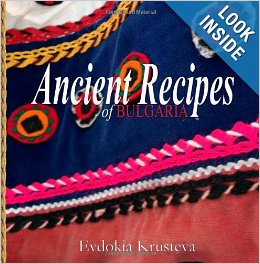 This cookbook features nearly two dozen truly ancient recipes of Bulgarian cooking. Some of these dishes are distant relatives to ones found in ancient Roman manuscripts believed to have been compiled in the late 4th or early 5th century AD. Others are among those far before the time of Christ. As Bulgaria is a country of oral history, recipes are typically not written, but passed down from one generation to the next by experiencing the method of preparation. With nearly every dish in Bulgarian cooking comes a story and custom. This cookbook attempts to preserve these hundred year old stories for many years to come so they can continue to be passed down.
This cookbook features nearly two dozen truly ancient recipes of Bulgarian cooking. Some of these dishes are distant relatives to ones found in ancient Roman manuscripts believed to have been compiled in the late 4th or early 5th century AD. Others are among those far before the time of Christ. As Bulgaria is a country of oral history, recipes are typically not written, but passed down from one generation to the next by experiencing the method of preparation. With nearly every dish in Bulgarian cooking comes a story and custom. This cookbook attempts to preserve these hundred year old stories for many years to come so they can continue to be passed down.
Preview and purchase directly on: Amazon Kindle Store
Global Network of Bulgarian Evangelical Churches outside of Bulgaria (2018 Report)
 Bulgarian Evangelical Churches in the European Union (2018 Report)
Bulgarian Evangelical Churches in the European Union (2018 Report)
- Bulgarian Evangelical Churches in Germany
- Bulgarian Evangelical Churches in Spain
- Bulgarian Evangelical Churches in England
- Bulgarian Evangelical Churches in France
- Bulgarian Evangelical Churches in Belgium
- Bulgarian Evangelical Churches in Italy
- Bulgarian Evangelical Churches in Cyprus
- Bulgarian Evangelical Churches in Crete
Bulgarian Evangelical Churches in America (2017 Report)
- Bulgarian Evangelical Churches in Chicago (2017 Report)
- Bulgarian Evangelical Churches in Texas (2017 Report)
- Bulgarian Evangelical Churches – West Coast (2017 Report)
- Atlanta (active since 1996)
- Los Angeles (occasional/outreach of the Foursquare Church – Mission Hills, CA)
- Las Vegas (outreach of the Foursquare Church – http://lasvegaschurch.tv)
- San Francisco (occasional/inactive since 2012, Berkeley University/Concord, CA)
Bulgarian Evangelical Churches in Canada (2017 Report)
- Toronto (inactive since 2007)
- Toronto/Slavic (active since 2009)
- Montreal (occasional/inactive since 2012)
CURRENTLY INACTIVE CHURCHES/CONGREGATIONS:
- New York, NY (currently inactive)
- Buffalo, NY (occasional/inactive)
- Jacksonville, FL (occasional/inactive since 2014)
- Ft. Lauderdale / Miami (currently inactive)
- Washington State, Seattle area (currently inactive)
- Minneapolis, MN (occasional/inactive since 2015)
READ MORE:
- First Bulgarian Church in Chicago Opened in 1907
- Gateway Cities for Bulgarian Evangelical Churches
- How to Start a Bulgarian Church in America from A-to-Z
- Unrealized Spiritual Harvest as a Paradigm for Cross-Cultural Ministries among Migrant and Disfranchised Ethnic Groups in America Today
Cooking Traditions of Bulgaria (now on Kindle)
Now also on Amazon’s Kindle Store
This cookbook features authentic recipes in attempts to further the tradition of keeping alive century old recipes of Bulgarian cuisine. Here you can learn how to make dishes from moussaka to baklava and others in between. The variety of tastes of authentic Bulgarian foods is much desired and the chosen recipes are easy to follow.
Go to amazon to see the table of contents and purchase
or purchase directly form CreatSpace eStore here: https://www.createspace.com/3890623
FIRST EDITION, 2012
Copyright © February, 2012 by Dony & Kathryn Donev
Cooking Traditions of Bulgaria
© 2012, Spasen Publishers, a division of www.cupandcross.com
Go to: Amazon’s Kindle Store
7 Difficulties for Mission Bulgaria in 2018
 Properties law expansion both in ownership and taxes
Properties law expansion both in ownership and taxes- Price jumps to European standards and drastic increase in cost of operation
- Foreign language ban in religious services
- Organizational registration and foreign financial support limited under new government legislation
- Increase of LGBT, third gender will be introduced with legislated ratification of the Istanbul Convention
- Various evangelical organizations relocating their headquarters and structure away from the capital Sofia with the formation of a third evangelical alliance
- Changes in education legislation demand even independent (denominational) religious schools and their degrees to operate exclusively under government approved colleges and universities
2020 Vision for Bulgarian Evangelical Churches outside of Bulgaria
January 25, 2018 by Cup&Cross
Filed under Featured, News, Publication, Research
 Over a decade ago, after publishing Bulgarian Churches in North America: Analytical Overview and Church Planting Proposal for Bulgarian American Congregations Considering Cultural, Economical and Leadership Dimensions, we purposed to explore the possibility of implementing the church planning program among Bulgarian Diasporas in various destination countries of migration.
Over a decade ago, after publishing Bulgarian Churches in North America: Analytical Overview and Church Planting Proposal for Bulgarian American Congregations Considering Cultural, Economical and Leadership Dimensions, we purposed to explore the possibility of implementing the church planning program among Bulgarian Diasporas in various destination countries of migration.
With this in mind, we carried the vision for establishing 20 Bulgarian churches outside of Bulgaria by the year 2020. Cyprus, the United Kingdom and Canada were among the first to successfully implement our program. Bulgarian migrant communities in France, Italy and especially Spain and Germany followed with great enthusiasm – there are 7 Bulgarian evangelical churches active in Span today, and 18 in Germany.
Of course, not all parts of the program proved to be efficient. The program’s modules and training that was implemented, however, have produced 47 strong church plants thus far and the number is growing every month. The program proposed has been confirmed by the leadership we have received from the Holy Spirit. Our commitment to seize the opportunity and work toward adding more Bulgarian churches by the year 202 has by far surpassed all expectations.
READ ALSO:
- Global Network of Bulgarian Evangelical Churches outside of Bulgaria (2018 Report)
- Unrealized Spiritual Harvest as a Paradigm for Cross-Cultural Ministries among Migrant and Disfranchised Ethnic Groups in America Today
Ancient Recipes of Bulgaria, Second Edition
 Ancient Recipes of Bulgaria, Second Edition
Ancient Recipes of Bulgaria, Second Edition
By Evdokia Krusteva
This cookbook features nearly two dozen truly ancient recipes of Bulgarian cooking. Some of these dishes are distant relatives to ones found in ancient Roman manuscripts believed to have been compiled in the late 4th or early 5th century AD. Others are among those far before the time of Christ. As Bulgaria is a country of oral history, recipes are typically not written, but passed down from one generation to the next by experiencing the method of preparation. With nearly every dish in Bulgarian cooking comes a story and custom. This cookbook attempts to preserve these century year old stories for many years to come so they can continue to be passed down.
Convention on Gender Violence Draws Backlash in Bulgaria
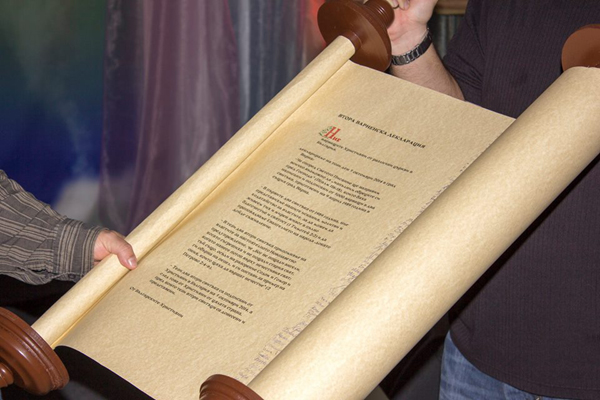 Moves to ratify the so-called Istanbul Convention of the Council of Europe are encountering strong opposition both from parties in the Bulgarian government and the opposition.
Moves to ratify the so-called Istanbul Convention of the Council of Europe are encountering strong opposition both from parties in the Bulgarian government and the opposition.
Members of the Bulgarian government and of the main opposition Socialist Party have joined forces to oppose the government’s decision to pass the so-called Istanbul Convention on gender-based violence to parliament for ratification.
The cabinet approved a national program for prevention of domestic violence on Wednesday, and, as a part of it, advised MPs to ratify the Council of Europe’s convention on preventing and combating violence against women and domestic violence, which was adopted in Istanbul in 2011. Following the government session, however, the Deputy Prime Minister in charge of social and economic policies, Valeri Simeonov, from the nationalist United Patriots, told the media that eight of the 21 ministers had voted against the document.
“Not only the United Patriots [who have four ministers] but eight ministers voted against,” he said. The names of the ministers who opposed the convention will be revealed on Friday, when the minutes of the cabinet meeting are published. The plan to pass the Convention, which Bulgaria signed in April 2016, for ratification in parliament, drew sharp criticism especially from one of the parties from the United Patriots Coalition, VMRO.
On December 28, the party, led by the Minister of Defence and Deputy Prime Minister, Krasimir Karakachanov, published a statement which claimed that, through the convention, “international lobbies are pushing Bulgaria to legalize the ‘third gender’.
The party declared itself firmly against the document, which it accused of “introducing school programs for studying homosexuality and transvestism and creating opportunities for enforcing same-sex marriages”. Over 30 civil and religious organizations had sent an open letter to Karakachanov, urging him not to allow ratification of the convention. As a result, he said, he had given a negative opinion of what he called the “scandalous text”. What has most upset nationalists is mention of the term “gender” as a social construct as opposed to the biological “sex” in the text of the document, although the explanatory report to the convention notes: “The term ‘gender’ … is not intended as a replacement for the terms ‘women’ and ‘men.’”
Bulgaria Allows Foreigners to Buy Land after EU Launched Proceeding
EU Launches Proceeding on Agricultural Land Ownership Laws in Bulgaria
Bulgaria May Scrap Barriers on Foreigners Buying Land Under EU pressure – and to avoid heavy fines – the Bulgarian government is moving to remove barriers against the acquisition of agricultural land by foreign citizens. The European Commission took a decision Thursday on demanding a clarification on thelaws regarding the acquisition of agricultural lands passed in Bulgaria, Hungary, Lithunia and Slovakia.
As announced by the commisison’s press office, several of the directives in the laws can be considered as hindrances to the free movement of capital within the borders of the EU. All restrictions to agricultural land ownership need to be substantiated and justified so that no doubt is left on possible discrimination against foreign investors.
The commission also noted that all countries have the righ to determine their own laws, but they also need to comply with the union’s anti-discrimination policies. Some of the dubious requirements listed in the Bulgarian legislation involve requirement for residence in the country, restrictions regarding people with no professional qualification, as well as a requirement for the preliminary approval of sales contracts.
The EU Commission’s official announcement letter marks the start of the proceeding, giving countries a two-month deadline to provide information on the case. The last amendment to the Bulgarian property law states that there will be BGN 100 per decar sanctions on land ownership upon Bulgarians with properties outside of the EU, Investor.bg reminded.
Currnetly: Foreigners or foreign legal persons may acquire ownership of a land under the terms of an international treaty ratified by the order of Art. 22, Par. 2 of the Constitution of the Republic of Bulgaria, promulgated and enforced, and foreigners – also by legal inheritance.


